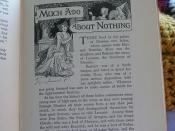"Much Ado About Nothing" is your traditional romantic comedy. Written by William Shakespeare, it is a perfect example of a timeless love story, including the classic components: drama, humor, and unsubstantial love. This comedy will have you laughing even if you don't understand half of the Shakespearean dialogue; it is witty, and surely will keep you on the edge of your seat wandering how even more twisted the plot could possibly be.
To give you an insight on just how complicated this love-story is, which is indeed, Much Ado About Nothing, begins with a majestic scene in the beautiful land of Tuscany. It is here where we are introduced to the beautiful, winner of 11 awards including an Oscar, a BAFTA, and a Golden Globe, Emma Thompson, who is playing Beatrice. The scene is closed when the news that Don Pedro, played by Densel Washington, has won a battle against Don John (Keanu Reeves), who happens to be his bastard half-brother, and that he, accompanied by his fellow soldiers- is returning to Messina.
There they are to settle for a month long vacation in Leonato's (Richard Briar) the governor's villa.
From then on, the love twist begins, and we find out that a young man named Claudio (Robert Sean Leonard) falls in love with a young woman called Hero, who is played by Kate Beckingsale. However, the love is put in jeopardy Claudio converses with Don Pedro when a conversation discussing their marriage was eavesdropped on by Antonio (Brian Blessed) who misunderstood, and believed that Don Pedro wanted to marry Hero. With this mix-up, and a bit of help from bastard Don John, it is believed that Hero is a whore, not long before she is thought of as dead by all.
Simultaneously to this love affair,


